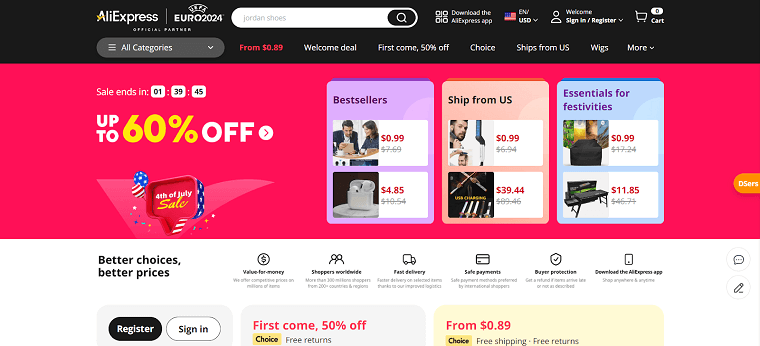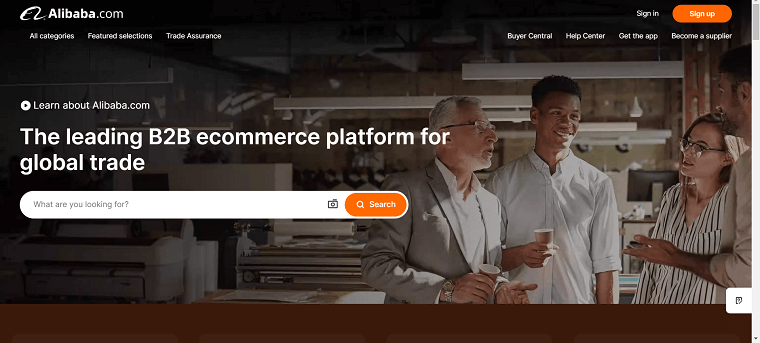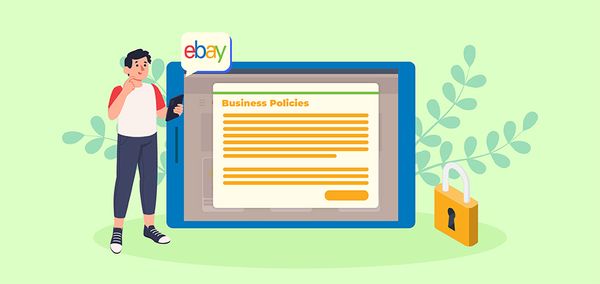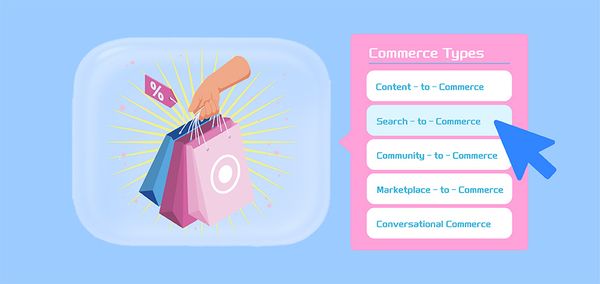AliExpress vs Alibaba: Which One Is Better for E-commerce

The most prominent players in the global e-commerce arena are Alibaba and AliExpress, which offer unique advantages and considerations for businesses of all sizes. AliExpress vs Alibaba, which one is better for e-commerce? In this guide, we will explore the key differences between them. Understanding the key differences can help you determine which one is the better fit for your e-commerce endeavors.
What Is AliExpress
AliExpress is an e-commerce platform aimed at consumers, also owned by the Alibaba Group. It primarily serves as a business-to-consumer (B2C) marketplace, allowing individual shoppers to explore and buy a diverse array of products directly from Chinese sellers and manufacturers.

The platform offers a diverse array of items, including electronics, fashion, home goods, toys, and more, often at prices that are significantly lower than those found in traditional retail channels.
What Is Alibaba
Alibaba is a Chinese multinational corporation that manages several e-commerce platforms, including the popular Alibaba.com. Primarily catering to a business-to-business (B2B) market, Alibaba.com serves as a global wholesale marketplace, connecting manufacturers, wholesalers, and suppliers with businesses around the world.

The platform provides a vast selection of products across numerous categories, from electronics and apparel to industrial equipment and raw materials. Alibaba's focus is on facilitating wholesale transactions and enabling businesses to source products directly from manufacturers and suppliers, often at competitive prices.
AliExpress vs Alibaba: B2B or B2C
The primary distinction between Alibaba and AliExpress lies in their target audience and the nature of the transactions they facilitate.
AliExpress for B2C
AliExpress, instead, is a B2C platform, where individual consumers can browse and purchase products directly from Chinese sellers and manufacturers. The platform is optimized for small-scale, direct-to-consumer transactions, offering a more user-friendly interface and a wider range of shipping options tailored to individual shoppers.
AliExpress is particularly appealing to consumers who are looking for unique, niche, or cost-effective products from overseas suppliers.
Alibaba for B2B
Alibaba is a B2B platform, designed to cater to the needs of businesses and professional buyers. On Alibaba, customers are typically other businesses, such as retailers, wholesalers, or manufacturers, who are seeking to source products in bulk quantities for their operations.
The platform is focused on facilitating large-scale transactions between suppliers and commercial buyers, with an emphasis on wholesale pricing, product quality, and reliable logistics.
AliExpress vs Alibaba: Dropshipping
Both Alibaba and AliExpress offer unique advantages and considerations for entrepreneurs interested in dropshipping.
AliExpress Dropshipping
AliExpress, with its focus on direct-to-consumer transactions, can be a more approachable platform for individual dropshippers. The platform's user-friendly interface, diverse product selection, and streamlined shipping and payment options make it relatively easy for small businesses and entrepreneurs to set up and manage their dropshipping operations.

|
Pre-set the Best Shipping Methods DSers Shipping Settings - Pre-select your favorite shipping method to save money and time |
AliExpress also offers a range of dropshipping-friendly features, such as the ability to integrate product listings directly into e-commerce platforms like Shopify, WooCommerce, and eBay. This can significantly simplify the process of building and maintaining a dropshipping business.
Alibaba Dropshipping
Alibaba's B2B focus makes it a compelling platform for businesses engaged in dropshipping. The platform's extensive network of suppliers and manufacturers allows dropshippers to source a wide range of products directly from the source, often at wholesale prices. This can translate into higher profit margins for the dropshipper.
And, Alibaba's supplier verification process and emphasis on product quality can help dropshippers identify reliable partners and mitigate risk. Many Alibaba suppliers also offer white-label private-label options, enabling dropshippers to create their own branded products.

|
Find Better Supplier For Products DSers Supplier Optimizer - One click to filter out the most proper suppliers for your products |
AliExpress vs Alibaba: Pricing
One of the key advantages of both Alibaba and AliExpress is their ability to offer competitive pricing, often significantly lower than traditional retail channels. However, the pricing structures and considerations on each platform differ.
Pricing on Alibaba
On Alibaba, pricing is primarily focused on wholesale and bulk purchasing. Suppliers on the platform typically offer volume-based discounts, where the per-unit price decreases as the order quantity increases.
This makes Alibaba an attractive option for businesses that require large quantities of products, as they can take advantage of these economies of scale and negotiate better deals with suppliers.
Pricing on AliExpress
AliExpress, on the other hand, caters to individual consumers who are typically purchasing smaller quantities. Prices on AliExpress are generally lower than those found in traditional retail stores, as the platform allows consumers to source products directly from Chinese manufacturers and suppliers.

|
Adapt Your Product Prices Automatically DSers Automatic Pricing - Pre-set Pricing Rule to mark-up your product price automatically |
However, the pricing on AliExpress may not be as heavily discounted as the wholesale prices offered on Alibaba, as the focus is on single-unit or small-batch sales rather than large-scale orders.
AliExpress vs Alibaba: Products
When it comes to the product offerings on Alibaba and AliExpress, there is a main difference that entrepreneurs and dropshippers should be aware of.
Alibaba: Wholesale and Bulk Products
Alibaba primarily serves as a B2B platform, targeting wholesale buyers and businesses. Consequently, the product offerings on Alibaba are typically focused on bulk, wholesale, and industrial-scale items. Buyers can often acquire products in large quantities at reduced wholesale prices.
The product categories on Alibaba are diverse, ranging from electronics and apparel to industrial machinery and raw materials. Alibaba is particularly well-known for its wide selection of manufacturing and sourcing options, making it a popular choice for businesses looking to create their own branded products or private-label items.
AliExpress: Consumer-Focused Products
In contrast, AliExpress is a more consumer-oriented platform, offering a wide range of individual, retail-sized products. The product selection on AliExpress is typically geared towards the needs and preferences of individual consumers, with a focus on items like electronics, fashion, home goods, and small-scale tools or accessories.
While Alibaba may offer better pricing for bulk orders, AliExpress is often more appealing for dropshippers and small businesses that need to fulfill individual customer orders. The platform's emphasis on consumer-friendly features, such as detailed product listings and customer reviews, can help dropshippers make more informed sourcing decisions.

|
Place Orders to AliExpress In Seconds DSers Bulk Order - Place 100s of orders to AliExpress in a few seconds with a just few clicks |
AliExpress vs Alibaba: Shipping
Shipping and logistics are critical considerations when sourcing products from global suppliers, and both Alibaba and AliExpress have distinct approaches to address these needs.
AliExpress Shipping
AliExpress, on the other hand, is primarily focused on direct-to-consumer shipping for individual shoppers. The platform offers a variety of shipping methods, including standard postal services, express couriers, and alternative delivery options.
While the shipping times and costs may vary, AliExpress generally provides more streamlined and consumer-friendly shipping solutions, with features like estimated delivery dates and tracking information.
Alibaba Shipping
Alibaba, as a B2B platform, typically offers more comprehensive shipping and logistics solutions. Suppliers on Alibaba often have established relationships with logistics providers and can offer a range of shipping options, such as air freight, ocean freight, and express delivery.
This caters to businesses requiring larger shipments, specialized transportation, or more advanced tracking and customs clearance services.
AliExpress vs Alibaba: Customization
The level of product customization available on Alibaba and AliExpress can vary, depending on the specific needs and requirements of the buyer.
AliExpress Customization
AliExpress, on the other hand, is primarily focused on offering a wide range of pre-manufactured products to individual consumers. While some AliExpress sellers may offer limited customization options, such as color or size variations, the platform is generally better suited for buyers who are looking for "off-the-shelf" products rather than highly customized solutions.
Alibaba Customization
Alibaba, as a B2B platform, often provides greater opportunities for product customization and personalization. Businesses on Alibaba can work directly with suppliers to request custom designs, modifications, or specialized packaging to meet their unique needs. This flexibility is particularly useful for businesses looking to create private-label products, develop specialized industrial equipment, or source custom-made components for their operations.
AliExpress vs Alibaba: Online Transactions
The process of conducting online transactions on Alibaba and AliExpress also differs, reflecting their respective target audiences and business models.
AliExpress: Online Transactions
In contrast, AliExpress is tailored to provide a more streamlined and user-friendly transaction experience for individual shoppers. The platform offers a variety of payment methods, including credit/debit cards, digital wallets, and local payment gateways, to provide a convenient checkout process. AliExpress also incorporates buyer protection features, such as order tracking, dispute resolution, and return policies, to help mitigate risks for individual shoppers.
Alibaba Online Transactions
Alibaba, as a B2B platform, often involves more complex and structured transaction procedures. Businesses on Alibaba typically engage in negotiation, contract drafting, and secure payment methods to facilitate large-scale, high-value transactions. The platform offers various payment options, such as wire transfers, letters of credit, and trade financing, to cater to the needs of commercial buyers.
AliExpress vs Alibaba: Which Is Better
Determining which platform, Alibaba or AliExpress, is better for e-commerce ultimately depends on the business's or individual buyer's specific needs and goals. Businesses and individuals should carefully evaluate their specific needs, and research both platforms thoroughly to decide.
AliExpress may be the more suitable option for individual consumers or small businesses that are looking to source products in smaller quantities and engage in direct-to-consumer transactions. AliExpress also offers more streamlined buyer protection features, which can be particularly beneficial for first-time or casual shoppers.
For businesses looking to source products in bulk quantities and engage in B2B transactions, Alibaba may be the better choice. Alibaba's B2B model also allows for more in-depth supplier vetting, contract negotiations, and secure payment methods, which can be crucial for businesses seeking to establish long-term, reliable supply chain partnerships.
Read more articles about AliExpress vs Alibaba with DSers blog!












 Company
Company
 Why Choose DSers
Why Choose DSers
 Blog
Blog
 Help Center
Help Center




 Live Chat
Live Chat